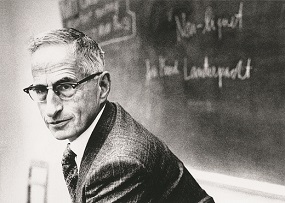
Stefan Albrecht Riesenfeld
Emanuel S. Heller Professor of Law, Emeritus
Boalt Hall School of Law and UC Hastings College of the Law
One of the preeminent scholars of international law in the twentieth century, Stefan Riesenfeld followed an especially complicated path to his luminous career as a member of the Boalt Hall School of Law faculty at the University of California, Berkeley. Riesenfeld was born in Breslau, Germany on June 8, 1908. After receiving his Dr Jur. summa cum laude from the University of Breslau in 1930, having published his dissertation on the law of mutual insurance companies, Riesenfeld practiced law until he moved to the University of Milan, where he received J.U.D. in 1934. It was in Milan where Riesenfeld met the famed Boalt Hall comparative-law scholar, Max Radin, who recommended him to the Boalt Hall dean, Edwin Dickinson. Dickinson was seeking a research associate to come to Berkeley to carry out studies in comparative law using German, French, and Italian sources. Riesenfeld accepted the invitation but felt that he needed a firm grasp of American law to succeed and was allowed to also enroll as a J.D. student at Boalt Hall, from which he received his degree with distinction in 1937. He accomplished this feat—simultaneously serving as a research associate while earning his American law degree—while learning spoken English. For the rest of his life he would use his thick German accent both to make points and to inject humor into his teaching.
Following his first visit to Berkeley he went on to teach at Harvard University, from which he received a J.S.D., and at the University of Minnesota before joining the U.S. Navy during World War II. After the war he returned to the faculty at Minnesota, where he also earned a degree in electrical engineering. In 1952, Dean William Prosser invited Riesenfeld to join the Boalt Hall faculty where he became a much-loved fixture until his death. Indeed, Professor Riesenfeld was a central figure at the Law School for decades, teaching several of the first-year courses, numerous advanced seminars, and practical commercial courses. He was a mentor to generations of international law scholars and was a delight to know. As former colleague Professor David Caron aptly put it, Riesenfeld “flourished at Berkeley and Berkeley flourished with him.”
Though he technically retired in 1976, Professor Riesenfeld continued teaching, both at Boalt and at UC Hastings College of Law, right up to the time of his death in 1999. A true polymath, Riesenfeld taught a wide variety of subjects and published prolifically in an equal range of fields. As a colleague observed, “He produced more research than the entire faculties of first rate law schools.” Indeed, the California Law Review published a then-complete bibliography of Professor Riesenfeld’s work in 1975 as part of an issue published as a tribute upon his taking emeritus status. Due to his continued productivity in his later years, the bibliography needed to be updated substantially in celebration of his 90th birthday. All told, Riesenfeld wrote or edited 32 books, 140 articles, and 119 book reviews, in areas as varied as comparative law, ocean law, bankruptcy, and legal history.
Beyond Berkeley, Professor Riesenfeld was an active participant in international law. As a few examples, he served as an advisor on the Panama Canal treaty, and as a civilian legal advisor to the High Commission in West Germany, helping to erect a post-war legal system. Professor Riesenfeld helped Hawaii in forming its government when it joined the United States. For two years he served as Special Counsel on International Law to the State Department during the Carter administration where he worked on issues related to the recognition of Taiwan and other important international problems. Professor Riesenfeld also appeared before the International Court of Justice as an advocate on three occasions.
In short, Riesenfeld was one of the most prominent and accomplished members of the Boalt Hall faculty in the twentieth century, an important influence not just on the institution and its students, but American and international law, writ large. Former Dean Herma Hill Kay remarked on Riesenfeld’s passing that he “was probably one of the best known of our faculty. To many people, especially in Europe, he personified our law school.” And, as Professor Caron remembered, “to be a scholar, in Riesenfeld’s view, was not merely to be an academic. Nor was it to adopt the equally simplistic activism of some. Rather, it was to believe in the importance and urgency of more fully understanding our world. Law and politics were important, and simplistic theoretical filters on such complex phenomena were potentially dangerous.”
Despite his prominence and his sometimes prickly classroom persona, Professor Riesenfield was a beloved figure at Boalt Hall. He is remembered by librarians not only for his encyclopedic knowledge of the collections, but for bringing them chocolate and home-canned apples. Decades’ worth of students remember fondly his quirky but effective style. A true original in the classroom, famous for his erudition, lack of notes, and use of humor, Professor Riesenfeld qualifies as a Berkeley Law legend, as demonstrated by the Berkeley Journal of International Law’s annual symposium named in his honor. As Professor Buxbaum remembers, “I have never known a teacher who, like Steve Riesenfeld, could be as tough a classroom instructor as any ‘Paper Chase’ caricature and yet, not one afterwards, but in the same setting, retain the affection and admiration of the students he was challenging.”
Beyond his exploits at Boalt Hall and in international law, Professor Riesenfeld was well known for his exceptionally green thumb. Indeed, in the Berkeley home in which he resided from 1952 until his death, he maintained an extraordinary and exotic collection of indoor plants, including cacti and rubber trees, which grew to the ceiling and around the walls.
At the time of his death, Riesenfeld was survived by his wife Phyllis, who passed away in 2009, two sons, Peter and Stefan, and two grandsons.
Robert C. Berring Jr.
Andrew Bradt
2018
